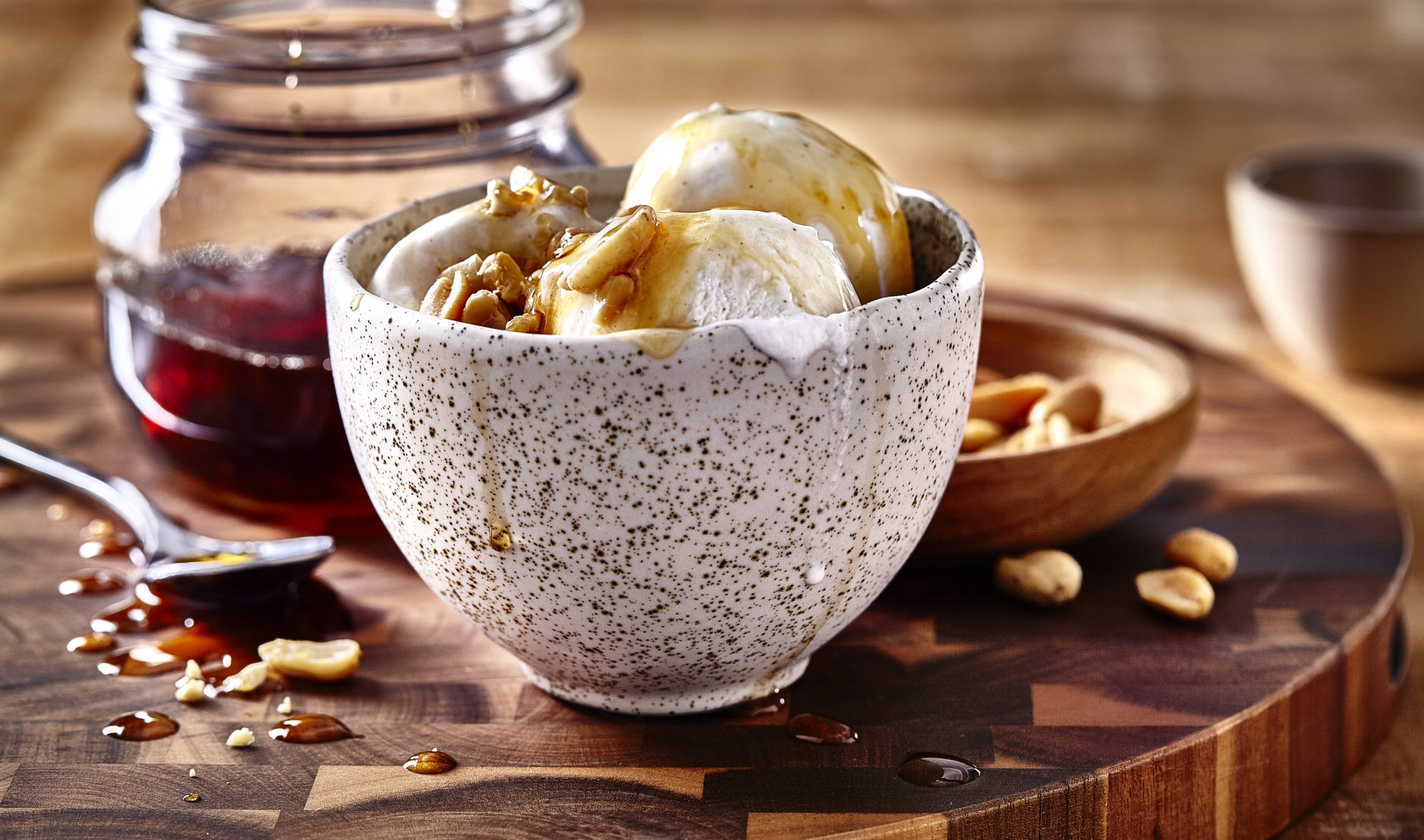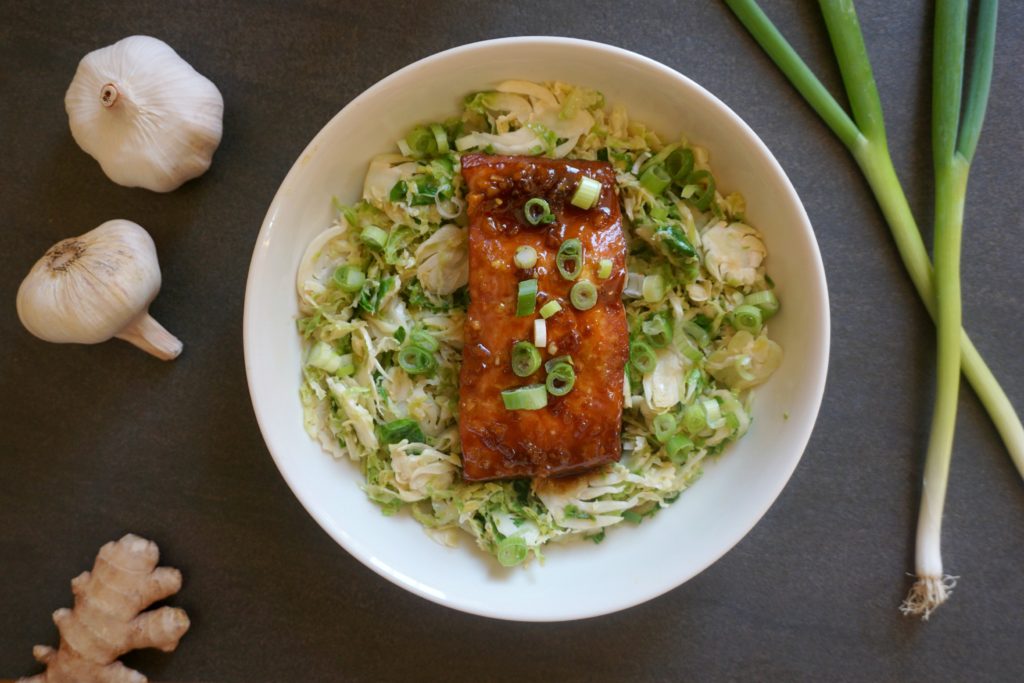Maple Syrup


Maple syrup is a sweet, flavorful syrup derived from the sap of the maple tree. The majority of the world’s maple syrup is produced in the Canadian province of Quebec. While high in sugar, maple syrup also offers some vitamins and minerals -- especially manganese and zinc. When buying maple syrup, always check the ingredients carefully. The real deal should contain only one ingredient: 100% pure maple syrup. Enjoy maple syrup on pancakes or waffles, in place of other sweeteners (such as white sugar) or incorporate it into glazes, marinades, and vinaigrettes.
Maple syrup is a sweet, flavorful syrup derived from the sap of the maple tree. The sugar maple, red maple, and black maple trees all produce syrup.
Extracting sap from maple trees is possible in cold climates where the trees store starch in their trunks, which becomes converted to sugar when the weather warms. When early spring arrives, the sap is extracted through holes drilled in the trees. To make the sap edible, it is cooked down into a sweet, edible syrup.
Maple syrup is a traditional food originally consumed by Aboriginal peoples in North America. Today, it is considered a quintessential “Canadian” food. The province of Quebec, Canada, is the largest producer of maple syrup in the world, accounting for 75% of the world’s maple syrup. The US also produces some maple syrup (about 5% of the world’s supply). Most American maple syrup comes from Vermont.
The process of “sugaring off” — i.e. producing syrup from the tapped maple trees — is often a time of celebration. Maple syrup festivities are common in late winter/early spring, especially in the Canadian provinces of Ontario and Quebec.
Maple syrup is amber in color, though the depth and darkness of color depends on its grade. As such, some syrups are a pale amber while others are rich, dark brown.
The syrup itself is shiny and glossy. The liquid has a sticky yet easy-pouring texture to it.
You can purchase maple syrup in cans or bottles.
One quarter-cup of maple syrup contains 216 calories, 0.03g of protein, 0.05g of fat, 55.6g of carbohydrates, and 50.2g of sugar.
While it is high in sugar, maple syrup does offer some advantageous health properties. It contains a range of vitamins and minerals, particularly manganese and zinc.
When selecting maple syrup, make sure it’s the real deal. Look for “100% pure” maple syrup. Many processed maple-flavored syrups and spreads exist, but these contain other additives, sweeteners, and in some cases, no actual maple at all.
Maple syrup types are categorized by grade. Grades do not indicate quality, but rather the flavor and color of the syrup. Grade A syrup is lighter in flavor, texture, and color while Grade B has a stronger flavor, a thicker viscosity, and darker color.
Bottled or canned maple syrup can be stored in the pantry. Once opened, maple syrup should be kept in the fridge.
Tip: Sugars that are stuck to the outside of the bottle can become very hard and crystallized, causing the lid to stick. If this happens, run the neck/top of the bottle under warm running water for a minute to release the lid.
Maple syrup has a sweet, slightly roasty, woodsy flavor with hints of vanilla. While most people are content simply to drizzle maple syrup on their pancakes, maple syrup aficionados declare that the syrup is actually quite complex tasting and can be tasted with the same thoughtfulness usually reserved for wine.
Maple syrup needs no preparation: simply drizzle it straight out of the bottle. It’s best known for its presence at the breakfast table — on pancakes, waffles, or oatmeal. But it can also add flavor to savory preparations: try using a dash of maple syrup in vinaigrettes, marinades, and glazes.
You can also use maple syrup as an alternative to other sugars (such as white sugar or corn syrup) when baking.

Sweet maple combines wonderfully with the deep umami of soy sauce to create a delicious glaze overtop of a tender salmon filet. Serve with a tasty and quick Brussels sprouts dish, also kissed with maple, that even Brussels sprout haters will love.
Prep Time: 20 minutes Cook Time: 15 minutes Yield: 2-4 servings
For the Salmon:
First, make your marinade: Add tamari/soy sauce, maple syrup, olive oil, garlic, and ginger to a shallow dish and whisk to combine. Place salmon filets in the marinade and let sit for two hours, rotating at intervals for even soaking.
Once the salmon is marinated, cook it. Be sure to keep the extra marinade that the salmon was sitting in, as it will be turned into a glaze.
Preheat the oven to 425 degrees Fahrenheit, and line a baking tray with tinfoil. Place the salmon, skin side down, on the tray and place in the oven.
Roast for about 6 minutes per half-inch thickness of salmon (as determined by the thickest part of the filet). Salmon is done when the flesh is opaque and easily flakes with a fork.
While the salmon is roasting, prepare the glaze, using the leftover marinade. Pour the marinade into a small saucepan and place over medium-high heat. Simmer the marinade for about 5-10 minutes, stirring frequently, until it thickens and turns syrupy. Remove from heat and allow to cool.
Once the salmon is cooked, drizzle with the glaze, sprinkle with green onion slices and serve alongside Brussels sprouts.
For the Maple Miso Brussels Sprouts
First, prepare the Brussels sprouts. After washing them, cut off the rough ends and pull off any discolored or wilted leaves. Using a sharp knife, cut the Brussels sprouts into very thin slices. Alternatively, use the slicing attachment on a food processor and pass the Brussels sprouts through it to create thin slivers.
Then, cook them: Add butter, miso, and maple syrup to a large skillet and heat over medium-high heat, whisking them together as the butter melts. Then, add sliced Brussels sprouts, tossing to coat with the butter sauce. Cook until Brussels sprouts wilt slightly and turn bright green, about 5 minutes.
Serve with salmon, and enjoy.
Precision Nutrition’s Encyclopedia of Food expands every single month as we highlight new foods and showcase beautiful food photography. If you’d like to stay up to date, simply click this link. From there, we’ll send you a FREE copy of our recipe book. We’ll also let you know when new and delicious foods are added to the site.
Maple syrup is a sweet, flavorful syrup derived from the sap of the maple tree. The majority of the world’s maple syrup is produced in the Canadian province of Quebec. While high in sugar, maple syrup also offers some vitamins and minerals -- especially manganese and zinc. When buying maple syrup, always check the ingredients carefully. The real deal should contain only one ingredient: 100% pure maple syrup. Enjoy maple syrup on pancakes or waffles, in place of other sweeteners (such as white sugar) or incorporate it into glazes, marinades, and vinaigrettes.